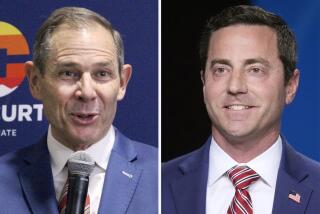Romney’s shaky front-runner perch
- Share via
Reporting from Washington and San Francisco — Six months before the scheduled start of the presidential primaries, Mitt Romney has staked a strong claim as the Republican front-runner in a contest shrouded by an unusual degree of volatility and uncertainty.
That’s often a good place to be in a party that typically rewards candidates like Romney who have run before and have the credentials — successful businessman, former governor — that he brings to the campaign.
But the rise of the “tea party” movement and a seething discontent with the establishment make Romney’s perch a precarious one, especially in a field that has yet to settle.
A sorting-out could begin this week, when the leading Republican contenders meet Thursday in Iowa’s first televised debate. Two days later, most will participate in a nonbinding straw vote, the first major head-to-head competition and an organizational dry run for the Iowa caucuses, which kick off the 2012 balloting.
Romney “has basically gone unchallenged, while maintaining what seems to be a singular focus on economic growth and job creation, which will pay dividends,” said Jim Dyke, a Republican consultant in South Carolina.
Like other unaligned strategists, Dyke credits the former Massachusetts executive with running a smart campaign, one that has largely avoided damaging stumbles while establishing a substantial fundraising advantage. He has benefited from a series of prolonged fights in Washington, which have diverted attention from the presidential campaign and made it more difficult for lesser-known contenders to gain ground.
“The clock is running out a little bit,” said Mike DuHaime, who ran Rudolph W. Giuliani’s 2008 presidential campaign. “Shortening the race is generally a good thing for the front-runner.”
The Washington distractions have also made it easier for Romney to lie low with impunity. He has campaigned far less frequently than leading contenders of the past, a tactic that has prompted largely fruitless attacks from his rivals. Romney, they complain, has been ducking important issues, like the recent debt ceiling debate.
“You can say that he hasn’t engaged,” said Republican pollster Linda DiVall. “But you can also say that he hasn’t made any mistakes. Everybody has to catch him.”
That has been the case all along. When the campaign began last winter, Romney was described as the weakest GOP front-runner in recent memory — a favorite in name only.
Critics pointed to his awkward campaign style and his inability to reach ordinary voters on an emotional level. There were lingering questions about the hurdle his Mormon religion poses with influential evangelicals, and his vulnerability on a variety of issues, especially healthcare. The individual coverage mandate he signed into law in Massachusetts became a model for the national Democratic plan and the feature most despised by Republicans.
But healthcare has all but vanished as an issue, as a faltering recovery has shifted attention to deepening concerns about jobs and the economy. Romney, exhibiting growth as a candidate, has opened a stature gap with the rest of the field. In the last debate, back in June, “he looked the most presidential,” DiVall said. “He’s learned to be a little shorter, more crisp in his answers. He’s learned to stand out.”
Meantime, other establishment candidates who had been expected to challenge Romney have failed to take off.
Former Minnesota Gov. Tim Pawlenty has invested heavily in Iowa, hoping to catch on there, as have previous long shots. Yet he’s been overshadowed by the biggest surprise of the early going, fellow Minnesotan Michele Bachmann, the congresswoman who has sparked enthusiasm among social and religious conservatives. Without a strong showing in the straw vote, Pawlenty may find it difficult to attract the money he’ll need to keep going.
Jon Huntsman Jr., a former Utah governor and ambassador to China, has battled internal campaign squabbles and, at least up to now, voter indifference as he attempts to challenge from the left. This week’s televised debate, his first, will provide an opportunity for Huntsman to take his increasingly sharp criticism of his rivals before a wider audience. He has accused Romney of demonstrating “zero leadership” for having dodged the debt limit debate until it was over.
By ultimately coming out against the deal, Romney effectively acknowledged that the biggest threat to his candidacy would probably come from the right. Exactly who will emerge as the conservative choice, however, remains unclear.
Bachmann, the hottest candidate at the moment, could reinforce her position as a favorite to win the Iowa caucuses with a victory in next weekend’s straw vote. Romney, who spent more than $1 million to win the summer popularity contest last time — only to lose the caucuses in the end — isn’t participating.
But many Republicans remain skeptical of Bachmann’s ability to gain the nomination, particularly if Rick Perry decides to run. The Texas governor is likely to enter the race in the next few weeks, filling a void for a serious contender from the party’s Southern base. His ties to conservatives and his status as governor of the nation’s largest Republican state simultaneously connect Perry to the socially conservative Republican right and the GOP establishment.
Whether it’s Bachmann, Perry or another candidate, Republican veterans point out, someone will eventually emerge to challenge Romney once the primaries get underway.
Romney’s front-runner status “could change after a few shots are fired, if there’s some mistake, some stumble,” said Ken Khachigian, a longtime GOP activist and former advisor to Ronald Reagan. “While I think he’s built up some amount of inoculation against attacks, I don’t think you have a very forgiving electorate, so that if you have one or two miscues and the emergence of someone who seems strikingly articulate or shines in a debate ... Romney could easily go down pretty quickly.”
West reported from Washington and Barabak from San Francisco.
More to Read
Get the L.A. Times Politics newsletter
Deeply reported insights into legislation, politics and policy from Sacramento, Washington and beyond. In your inbox twice per week.
You may occasionally receive promotional content from the Los Angeles Times.











